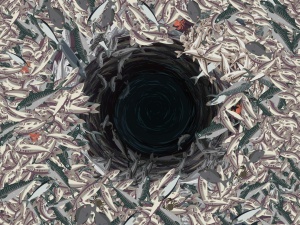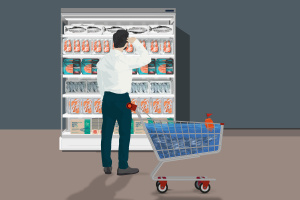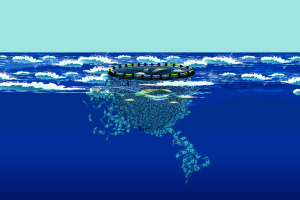Exposé on Peru’s fishmeal and fish oil Industry reveals rampant abuses and links to UK aquaculture and retailers
- Exposé on Peru’s fishmeal and fish oil Industry reveals rampant abuses and links to UK aquaculture and retailers
- Calls for phase-out of wild-caught fish feed used in fish farming
A new report about Peru’s massive fishmeal and fish oil (FMFO) industry by the Changing Markets Foundation raises troubling questions about the impact farm-raised seafood is having on the health of ocean ecosystems. It also reveals that several UK-based companies, such as Scottish Sea Farms, Grieg Seafood, Sainsbury’s, and Marks & Spencer, are linked through their supply chains to Peruvian and Norwegian-owned companies involved in multiple scandals.
The Peruvian anchovy (anchoveta) fishery encompasses the biggest single-species harvest in the world and 99% of it goes to make FMFO to raise animals (pigs, chickens, and mink), as well as farm-raised fish. A significant percentage of the product is exported to Europe as a feed ingredient for the Norwegian and Scottish farmed salmon business. Although Peru is promoted by the industry as a ‘global leader of responsibly sourced marine ingredients’, the report reveals a litany of corruption, environmental and social scandals.
“Contrary to the image big industrial players seek to project, the Peruvian FMFO sector is rife with corruption and highly unsustainable practices, such as targeting juveniles and the systematic underreporting of catches. These practices are largely driven by demand from international companies that source a significant amount of fish oil to produce aquafeed for farmed seafood. With its use of wild-caught fish to feed farmed fish, aquaculture is not the panacea to overfishing the industry claims to be, and seafood eaters in high-income markets may unwittingly be contributing to the destruction of ocean ecosystems when they purchase products like farm-raised salmon and prawns,” said Natasha Hurley, Campaign Manager at the Changing Markets Foundation.
The findings also undermine the credibility of MarinTrust and its Global Standard for Responsible Supply (formerly IFFO RS) – the FMFO industry’s main certification body – that continue to certify several of the companies involved in multiple scandals. Furthermore, the report calls on other sustainability schemes, such as the Marine Stewardship Council, to rule out the certification of wild-capture fisheries for anything other than direct human consumption.
The findings are the result of a detailed investigation conducted between February and October 2020, as well as extensive supply chain research. They tell a story of rampant mismanagement and corruption that is pushing Peruvian anchovy stocks to the brink. What’s worse, the population already faces extreme pressure from El Niño events, which have led to periodic collapses in the past and are becoming more frequent with climate change.
Last January, Peruvian fishers who depend on the fishery for their livelihoods, took the highly unusual step of marching in the streets to protest the mass harvest of juvenile anchovies, and called for the immediate closure of the fishing season to protect stocks. However, their calls went unheeded and in one particularly shocking case, fishermen were told they would be fired if they refused to resume fishing.
Disturbingly, the same investigation also discovered that the industry has put the lives of fishers and FMFO plant workers at risk by forcing them to work during Covid-19 outbreaks, violating its own health and safety regulations. This led to unnecessary infections of fishers and plant workers, as well as hundreds of deaths in the country’s fishing ports. The report calls for an independent investigation into the handling of the pandemic by the FMFO industry.
“Our research shows that as soon as you scratch the surface, all sustainability claims relating to the Peruvian anchovy fishery, by those with a commercial interest in FMFO, fall flat. Fish farming companies, aquafeed producers, and retailers need to stop using FMFO and accelerate the transition to alternative feeds and genuinely sustainable aquaculture models that do not require wild-caught fish,” said Hurley.
Key Findings:
Last year, nearly one-third of Peru’s fishmeal exports (32%) and fish oil exports (29%) were generated by two companies – the Peruvian-owned TASA and Norwegian-owned Austral Group – which have been linked to not only overfishing juvenile anchovies and underreporting catches but also violating critical health and safety standards as the global Covid-19 pandemic swept through Peru’s fishing ports and FMFO plants.
TASA supplies feed giants that produce millions of tonnes of aquafeed for the global market, including Norwegian feed companies EWOS/Cargill and Skretting and the Danish-owned BioMar.
These companies all supply major retailers, including Aldi, Marks & Spencer and REWE in Europe. All three aquafeed companies are also listed as suppliers to Lerøy, the world’s second-largest farmed Atlantic salmon producer.
Last year, Mowi, a Norwegian salmon-farming and feed giant, and the world’s largest producer of farmed Atlantic salmon, sourced 40.2% of its fish oil from anchovies fished in Peruvian and Chilean waters. It supplies farmed salmon to some of Europe’s biggest supermarket chains and is the UK-based retailer Sainsbury’s main supplier.
Lerøy, a subsidiary of Norwegian seafood giant Austevoll, and one of the largest fishing groups in the world, sourced over one-quarter (26.4%) of its fish oil from Peru in 2019. It supplies farmed salmon to major international retailers, including Ikea, Tesco, Carrefour, and Spanish retailer Mercadona. Through its UK subsidiary, Scottish Sea Farms, Lerøy also supplies salmon to British retailer Marks & Spencer.
ENDS
Further information
About the Changing Markets Foundation
The Changing Markets Foundation was formed to finance and support campaigns that accelerate and scale up solutions to sustainability challenges by leveraging the power of markets. It works to identify critical issues that require urgent action, spread ideas that engage and mobilise people and design campaigns to promote market shifts that support sustainability. Its research includes market and supply-chain investigations.
About the report
The report, entitled What Lies Beneath: Uncovering the truth about Peru’s colossal fishmeal and fish oil industry is based on qualitative research on Peru’s fishmeal and fish oil industry, the Peruvian anchovy fishery, interviews with experts, observers on the ground in Peru, and an extensive review of the academic literature. It is available from changingmarkets.org/portfolio/fishing-the-feed/
You might also like...

Fishing for Catastrophe
This report presents damning evidence that the production of fishmeal and fish oil for use in the growing global aquaculture industry is destroying fish stocks, marine ecosystems and traditional livelihoods.

Caught Out: How UK retailers are tackling the use of wild fish in their aquaculture supply chains
This report scores the top 10 UK supermarkets to assess how effectively they are addressing the ocean sustainability implications of the farmed seafood they sell, which remains largely reliant on the use of ...

Investing in troubled waters: the material risks of fish mortality and the use of wild-caught fish in feed for the aquaculture sector
This report shows investors could be doing much more to push companies to rapidly address two critical business risks: the use of wild-caught fish in feed and high mortality rates that stem from poor fish we...